| Srl | Item |
| 1 |
ID:
085454


|
|
|
| 2 |
ID:
103700


|
|
|
|
|
| Publication |
2011.
|
| Summary/Abstract |
This article investigates the prospects of deliberative democracy through the analysis of small-scale deliberative events, or mini-publics, using empirical methods to understand the process of preference transformation. Evidence from two case studies suggests that deliberation corrects preexisting distortions of public will caused by either active manipulation or passive overemphasis on symbolically potent issues. Deliberation corrected these distortions by reconnecting participants' expressed preferences to their underlying "will" as well as shaping a shared understanding of the issue.The article concludes by using these insights to suggest ways that mini-public deliberation might be articulated to the broader public sphere so that the benefits might be scaled up. That mini-public deliberation does not so much change individual subjectivity as reconnect it to the expression of will suggests that scaling up the transformative effects should be possible so long as this involves communicating in the form of reasons rather than preferred outcome alone.
|
|
|
|
|
|
|
|
|
|
|
|
|
|
|
|
| 3 |
ID:
193705


|
|
|
|
|
| Summary/Abstract |
We show, against skeptics, that however latent it may be in everyday life, the ability to reason effectively about politics can readily be activated when conditions are right. We justify a definition of deliberative reason, then develop and apply a Deliberative Reason Index (DRI) to analysis of 19 deliberative forums. DRI increases over the course of deliberation in the vast majority of cases, but the extent of this increase depends upon enabling conditions. Group building that activates deliberative norms makes the biggest difference, particularly in enabling participants to cope with complexity. Without group building, complexity becomes more difficult to surmount, and planned direct impact on policy decisions may actually impede reasoning where complexity is high. Our findings have implications beyond forum design for the staging of political discourse in the wider public sphere.
|
|
|
|
|
|
|
|
|
|
|
|
|
|
|
|
| 4 |
ID:
154140


|
|
|
|
|
| Summary/Abstract |
This essay reflects on the development of the field of deliberative democracy by discussing twelve key findings that capture a number of resolved issues in normative theory, conceptual clarification, and associated empirical results. We argue that these findings deserve to be more widely recognized and viewed as a foundation for future practice and research. We draw on our own research and that of others in the field.
|
|
|
|
|
|
|
|
|
|
|
|
|
|
|
|